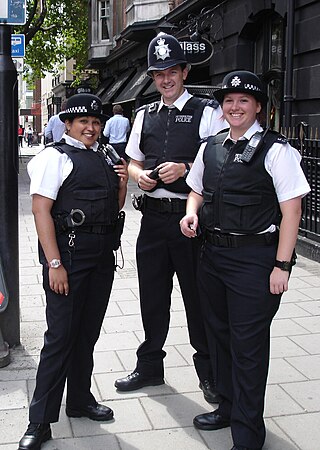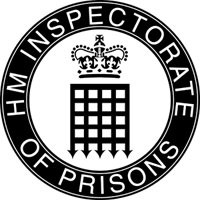
The Regulation of Investigatory Powers Act 2000 is an Act of the Parliament of the United Kingdom, regulating the powers of public bodies to carry out surveillance and investigation, and covering the interception of communications. It was introduced by the Tony Blair Labour government ostensibly to take account of technological change such as the growth of the Internet and strong encryption.

The Home Office (HO), also known as the Home Department, is a ministerial department of the Government of the United Kingdom. It is responsible for immigration, security, and law and order. As such, it is responsible for policing in England and Wales, fire and rescue services in England, Border Force, visas and immigration, and the Security Service (MI5). It is also in charge of government policy on security-related issues such as drugs, counterterrorism, and immigration. It was formerly responsible for His Majesty's Prison Service and the National Probation Service, but these have been transferred to the Ministry of Justice.

A justice of the peace (JP) is a judicial officer of a lower court, elected or appointed by means of a commission to keep the peace. In past centuries the term commissioner of the peace was often used with the same meaning. Depending on the jurisdiction, such justices dispense summary justice or merely deal with local administrative applications in common law jurisdictions. Justices of the peace are appointed or elected from the citizens of the jurisdiction in which they serve, and are usually not required to have any formal legal education in order to qualify for the office. Some jurisdictions have varying forms of training for JPs.

The Scottish Government is the executive arm of the devolved government of Scotland. It was formed in 1999 as the Scottish Executive following the 1997 referendum on Scottish devolution, and is headquartered at St Andrew's House in the capital city, Edinburgh. It has been described as one of the most powerful devolved governments globally, with full legislative control over the economy, education, healthcare, justice and the legal system, rural affairs, housing, the crown estate, the environment, the fire service, equal opportunities, the transportation network, and tax, amongst others.

The Welsh Government is the executive arm of the devolved government of Wales. The government consists of cabinet secretaries and ministers. It is led by the first minister, usually the leader of the largest party in the Senedd, who selects ministers with the approval of the Senedd. The government is responsible for tabling policy in devolved areas for consideration by the Senedd and implementing policy that has been approved by it.

Law enforcement in the United Kingdom is organised separately in each of the legal systems of the United Kingdom: England and Wales, Scotland, and Northern Ireland. Most law enforcement duties are carried out by police constables of a territorial police force.

The Scottish Office was a department of the Government of the United Kingdom from 1885 until 1999, exercising a wide range of government functions in relation to Scotland under the control of the Secretary of State for Scotland. Following the establishment of the Scottish Parliament in 1999, most of its work was transferred to the newly established Scottish Executive, with a small residue of functions retained by the Scotland Office.

His Majesty's Prison Service (HMPS) is a part of HM Prison and Probation Service, which is the part of His Majesty's Government charged with managing most of the prisons within England and Wales.
Chapter 10: State Services.Chapter 10 of the 1997 Constitution of Fiji is titled State Services. Its fifteen sections establish certain civil service offices, specify their functions and jurisdictions, set out the qualifications and preconditions required of persons holding such offices, and prescribes the manner of their appointment.
A police authority in the United Kingdom is a public authority that is responsible for overseeing the operations of a police force. The nature and composition of police authorities has varied over time, and there are now just four dedicated "police authorities" in the United Kingdom, although the term can refer to various similar successor bodies.

Public bodies of the Scottish Government are organisations that are funded by the Scottish Government. They form a tightly meshed network of executive and advisory non-departmental public bodies ("quangoes"); tribunals; and nationalised industries. Such public bodies are distinct from executive agencies of the Scottish Government, as unlike them they are not considered to be part of the Government and staff of public bodies are not civil servants, although executive agencies are listed in the Scottish Government's directory of national public bodies alongside other public bodies.

The Department of Justice, Home Affairs and Migration is a department of the Government of Ireland. It is led by the Minister for Justice, Home Affairs and Migration. The department's mission is to maintain and enhance community security and to promote a fairer society in Ireland.

His Majesty's Chief Inspector of Prisons is the head of HM Inspectorate of Prisons and the senior inspector of prisons, young offender institutions and immigration service detention and removal centres in England and Wales. The current chief inspector is Charlie Taylor.
The Ministry of Education (1944–1964) was a central government department governed by the Minister of Education, with responsibility in England and Wales for:
- Promoting the education of people;
- Developing educational institutions;
- Developing policy to provide a comprehensive educational service;
- Securing the effective execution of the education policy by local education authorities
An independent custody visitor is someone who visits people who are detained in police stations in the United Kingdom to ensure that they are being treated properly. Prisoner escort and custody lay observers carry out a similar function in relation to the escort of prisoners from one place to another, or their custody at court.
The Prison Commission was a public body of the Government of the United Kingdom established in 1877 and responsible for overseeing the operation of HM Prison Service. It was merged into the Home Office on 1 April 1963 to become the Prisons Department.

Prisons in Ireland are one of the main forms of punishment, rehabilitation, or both for the commission of an indictable offense and other offenses.

The Criminal Justice Act 1991 is an Act of the Parliament of the United Kingdom. Most of it only applies to England and Wales, with certain clauses extended to either Northern Ireland or Scotland. The Act enabled the introduction of private prisons to the United Kingdom, attempted to reform the system of fines in England and Wales, established HM Inspectorate of Probation as a statutory body, and allowed for the Home Secretary to release foreign prisoners from prison to enable their deportation.
This is a list of Permanent Under-Secretaries for Scotland in the Civil Service. It should not be confused with the Parliamentary Under-Secretary of State for Scotland.











